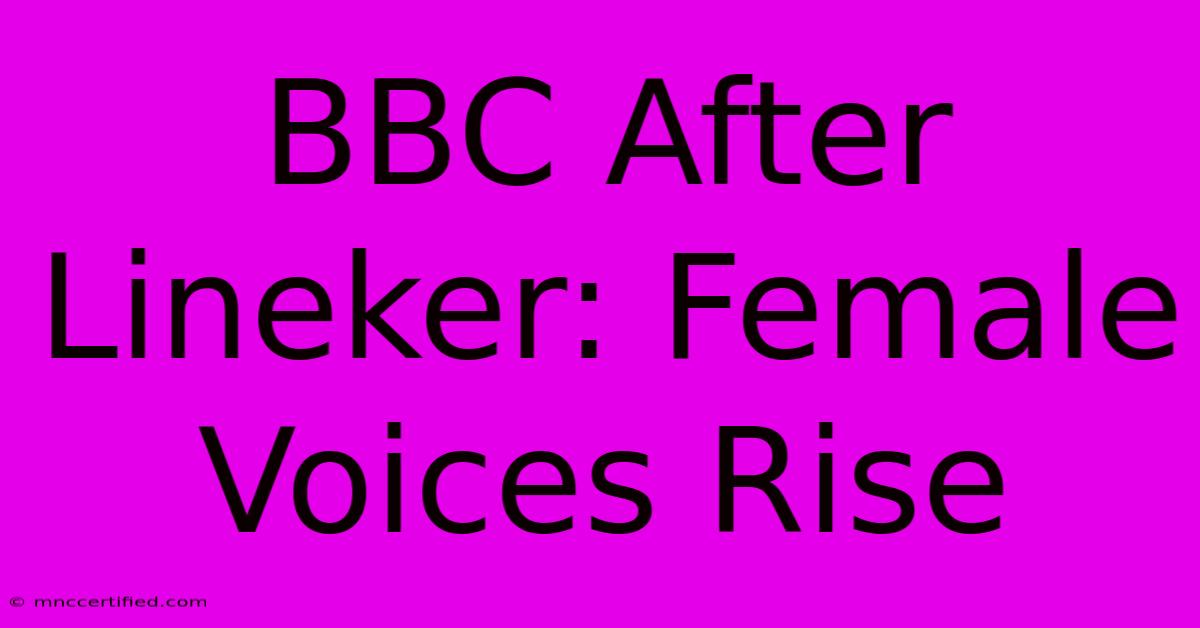BBC After Lineker: Female Voices Rise

Table of Contents
BBC After Lineker: Female Voices Rise
The recent Gary Lineker controversy at the BBC ignited a firestorm, sparking debates about impartiality, freedom of speech, and the power dynamics within the corporation. While the focus initially remained on Lineker himself, a significant, yet often overlooked, consequence emerged: the amplification of female voices within the BBC and broader media landscape. This article explores the rise of female voices in the aftermath of the Lineker saga, examining the impact on the public discourse and the potential for lasting change.
The Silence Before the Storm: Underrepresentation in the Media
Before the Lineker controversy, concerns regarding the underrepresentation of women in media, particularly in prominent presenting and commentary roles, were already prevalent. Many argued that a systemic bias existed, limiting opportunities and silencing diverse perspectives. While progress had been made, the disparity remained significant. The lack of female voices in key positions contributed to a skewed narrative, often excluding the lived experiences and viewpoints of women.
The Lineker Effect: A Catalyst for Change?
Lineker's suspension, and the subsequent walkout by several prominent BBC presenters, created a vacuum. This vacuum, inadvertently, provided an opportunity for female presenters and commentators to step into the spotlight, showcasing their expertise and opinions on a wider platform. The controversy forced a conversation about gender equality, highlighting the imbalance and demanding a more inclusive approach. Suddenly, discussions about impartiality weren't solely focused on male presenters; they encompassed the broader landscape of representation and fairness within the BBC.
Amplified Voices: New Perspectives and Narratives
The fallout from the Lineker affair resulted in a noticeable shift. More women were given platforms to express their views, leading to a richer, more nuanced discussion. This wasn't simply about filling a quota; it was about incorporating diverse perspectives that had previously been marginalized. This inclusivity enriched the public discourse, offering viewers a broader understanding of the issues at hand.
Beyond the Immediate Fallout: Long-Term Implications
The increased visibility of female voices post-Lineker isn't just a temporary phenomenon. It presents an opportunity for lasting change within the BBC and the wider media industry. Increased representation leads to better programming, more accurate reporting, and a more inclusive media landscape that reflects the diverse experiences of its audience.
The Road Ahead: Maintaining Momentum
While the increased visibility of women following the Lineker controversy is positive, sustaining this momentum is crucial. The BBC and other media organizations must actively work to create a truly equitable and inclusive environment. This involves concrete actions such as:
- Implementing robust diversity and inclusion policies: These policies should extend beyond mere targets and include measures to address unconscious bias and promote equal opportunities at all levels.
- Investing in training and development programs: Programs designed to empower and support women in media should be prioritized to enhance skills and career progression.
- Prioritizing diverse voices in content creation: Ensuring that stories and perspectives from women are central to programming, not just peripheral additions.
- Promoting transparency and accountability: Regularly assessing progress towards gender equality and addressing any shortcomings.
The BBC's handling of the Gary Lineker situation, while controversial, inadvertently highlighted a critical need for change. The rise of female voices in its aftermath provides a glimmer of hope, suggesting that the controversy may act as a catalyst for a more inclusive and representative media landscape. However, maintaining this momentum requires sustained commitment and action from the BBC and the wider media industry. Only then will we truly see lasting change and a more equitable future for female voices in broadcasting.

Thank you for visiting our website wich cover about BBC After Lineker: Female Voices Rise. We hope the information provided has been useful to you. Feel free to contact us if you have any questions or need further assistance. See you next time and dont miss to bookmark.
Featured Posts
-
Live Perez Future Uncertain At Red Bull
Dec 19, 2024
-
Jordan North Faces Criticism For River Jump
Dec 19, 2024
-
Wrights Revenge Littler Showdown
Dec 19, 2024
-
Arsenal Vs Crystal Palace Live Match Blog
Dec 19, 2024
-
Eddie Stobart Cumbrian Haulage Founder
Dec 19, 2024